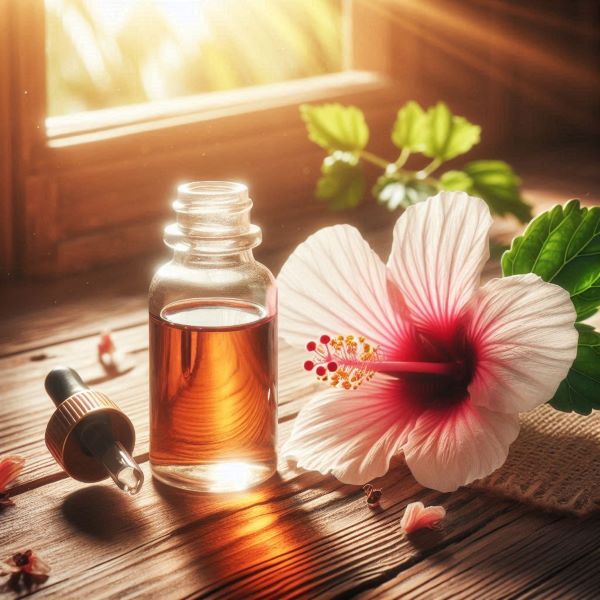Hibiscus oil, derived from the flowers and leaves of the Hibiscus plant (Hibiscus rosa-sinensis), has been treasured for centuries in various cultures for its wide array of health and beauty benefits. Known for its vibrant red flowers, the hibiscus plant is not only ornamental but also offers numerous therapeutic properties. This article provides a comprehensive overview of hibiscus oil, including its nutritional profile, benefits, uses, therapeutic advantages, properties, side effects, and interesting facts, all supported by scientific evidence. (Source)
Nutritional Profile of Hibiscus Oil
It is rich in various nutrients and bioactive compounds that contribute to its health benefits:
- Fatty Acids:
- Linoleic Acid (Omega-6): Supports skin health and maintains the skin’s barrier.
- Oleic Acid (Omega-9): Beneficial for heart health and provides deep moisture.
- Palmitic Acid: Provides moisturizing properties.
- Vitamins:
- Minerals:
- Iron, Zinc, Magnesium: Important for various bodily functions and skin health.
- Amino Acids: Building blocks of proteins essential for tissue repair and growth.
- Phytochemicals:
- Anthocyanins: Antioxidants that provide the characteristic red color and protect against oxidative stress.
- Flavonoids: Compounds that offer anti-inflammatory and antioxidant benefits.
Benefits of Hibiscus Oil
1. Hair Health
It is renowned for its benefits to hair:
- Promotes Hair Growth: Stimulates hair follicles, encouraging growth and reducing hair loss.
- Conditions Hair: Deeply moisturizes the hair, making it smooth, shiny, and manageable.
- Prevents Premature Graying: Helps maintain natural hair color.
- Reduces Dandruff: Has antimicrobial properties that help treat and prevent dandruff.
2. Skin Health
It provides several benefits for the skin:
- Moisturizes Skin: Provides deep hydration, keeping the skin soft and supple.
- Anti-aging: Rich in antioxidants and vitamins that help reduce the appearance of fine lines and wrinkles.
- Soothes Inflammation: Helps calm irritated and inflamed skin.
- Brightens Complexion: Evens out skin tone and reduces hyperpigmentation.
3. Immune Support
It can enhance immune function:
- Boosts Immunity: Rich in vitamin C and antioxidants, which support immune health.
4. General Health Benefits
- Anti-inflammatory: Reduces inflammation, beneficial for conditions like arthritis.
- Antioxidant: Protects cells from oxidative damage, reducing the risk of chronic diseases.
- Improves Circulation: Enhances blood flow, which can support overall health and vitality.
Uses of Hibiscus Oil
Hair Care
- Scalp Massage: Applied directly to the scalp to stimulate hair growth and improve hair health.
- Hair Mask: Mixed with other natural ingredients and used as a deep conditioning treatment.
- Leave-In Conditioner: Used to tame frizz and add shine to hair.
Skin Care
- Moisturizer: Used to hydrate and nourish the skin.
- Anti-Aging Serum: Applied to reduce the appearance of fine lines and wrinkles.
- Spot Treatment: Used to reduce hyperpigmentation and even out skin tone.
Therapeutic Uses
- Aromatherapy: Used in aromatherapy for its calming and rejuvenating effects.
- Massage Oil: Used in therapeutic massages to relieve muscle pain and tension.
Therapeutic Advantages
Hibiscus oil offers numerous therapeutic benefits due to its rich composition:
- Anti-inflammatory: Reduces inflammation, making it useful for treating various inflammatory conditions.
- Antimicrobial: Helps in fighting bacterial and fungal infections, promoting scalp and skin health.
- Antioxidant: Protects cells from damage, supporting overall health and wellness.
Properties of Hibiscus Oil
- Antioxidant: Protects against free radical damage.
- Anti-inflammatory: Reduces inflammation in the body.
- Antimicrobial: Effective against various pathogens.
- Emollient: Moisturizes and softens the skin and hair.
Side Effects
While hibiscus oil is generally safe, some individuals may experience:
- Allergic Reactions: Can cause allergic reactions in some individuals, including itching, redness, and swelling.
- Skin Irritation: This may cause irritation when applied to sensitive skin without proper dilution.
Also, read: All You Need to Know about Kalonji Oil Now
Interesting Facts
- Historical Use: Hibiscus has been used in traditional medicine and beauty rituals for centuries.
- Cultural Significance: In various cultures, hibiscus is considered a symbol of beauty and fertility.
- Versatility: Beyond hair and skin care, hibiscus is also used in teas and herbal remedies.
Scientific Evidence
Numerous studies support the health benefits of hibiscus oil:
- A study published in the Journal of Ethnopharmacology found that hibiscus extract has potent antioxidant properties, protecting cells from oxidative stress. (Source)
- Research in the International Journal of Trichology showed that hibiscus oil promotes hair growth and reduces hair loss in animal models. (Source)
- Another study in the Journal of Ayurveda and Integrative Medicine demonstrated the anti-inflammatory and antimicrobial properties of hibiscus, supporting its use in treating various skin and scalp conditions. (Source)
Conclusion
Hibiscus oil is a versatile and beneficial oil, rich in vitamins, minerals, and bioactive compounds that promote hair health, skin health, immune support, and overall wellness. Its applications in hair care, skin care, and treatments make it a valuable addition to any health and beauty regimen. While generally safe, it’s important to use hibiscus oil in moderation and be aware of potential side effects. Incorporating hibiscus oil into your daily routine can lead to improved health, beauty, and overall well-being.





